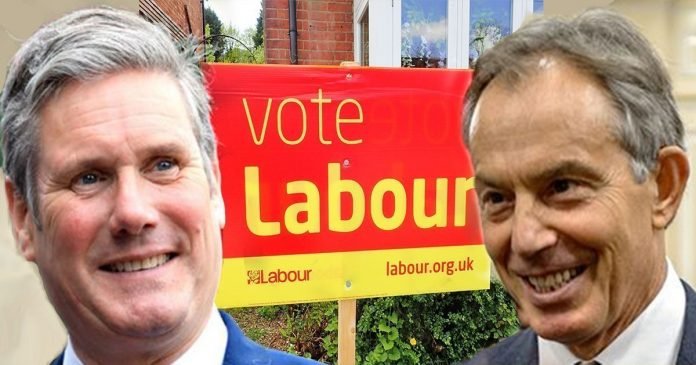By Bernie Willcox
Reading the papers reporting on the Labour Party Conference, the conventional wisdom seems to be that in order to win the next election, Labour has to move to the right and ditch the “unpopular” ideas associated with Jeremy Corbyn.
But is this true and what evidence is there that this would work and Kier Starmer could at last beat a philandering, lying Old Etonian who has actually parked his tanks on the centre ground lawn.
A key matter here is the Scottish Labour votes.
In 1997, Blair won 56 seats in Scotland. Corbyn inherited just one and did exceptionally well in 2017 to increase that to seven. In percentages of the 1997 total popular vote, Blair had 4.1% of his votes that came from Scotland whereas in 2017, Corbyn had just 2.2% or a drop of 1.9%. It cannot be said that this was in any way Corbyn’s fault that the Labour vote in Scotland had collapsed because it was all done and dusted before his leadership bid was even a twinkle in John McDonnell’s eye and in any case, he increased his number of seats seven-fold in 2017 (before promptly losing them again in 2019).
The table below gives an adjusted share of the popular vote that Labour leaders have achieved starting with Blair in 1997 and also adjusted for the loss of the Scottish votes by decreasing the gross vote percentages accordingly.
| 1997 | 2001 | 2005 | 2010 | 2015 | 2017 | 2019 | |
| Leader | Blair | Blair | Blair | Brown | Milliband | Corbyn | Corbyn |
| % Total Vote | 43.2% | 40.7% | 35.2% | 29.0% | 30.4% | 40.0% | 32.1% |
| Change On Prev. GE | +8.8% | -1.5% | -5.5% | -6.2% | +1.4% | +9.6% | -7.9% |
| Number Scottish Seats | 56 | 56 | 41 | 41 | 1 | 7 | 1 |
| % Scottish Vote | 4.1% | 3.9% | 3.4% | 3.8% | 2.3% | 2.2% | 1.6% |
| Adjusted % Total Vote | 39.1% | 36.8% | 31.8% | 25.2% | 28.1% | 37.8% | 30.5% |
We should remember that Blair came to power after 18 years of Tory rule with the Major Government being very unpopular because of its huge amounts of sleaze. For a photogenic, reforming young hipster like Blair, it was an open goal and he increased the Labour vote by 8.8% into what was considered a landslide.
From there on in, Blair became increasingly unpopular and Corbyn’s adjusted 2017 percentage was not only just 1.3% short of Blair’s landslide but this was achieved by increasing the Labour vote by a Blair-busting 9.6% and beat both of Blair’s subsequent adjusted vote percentages.
It should also be pointed out that he was able to do this at the same time as he faced a brutal media assault and was undermined by his own party apparatus which seemed to prefer a Mother Theresa victory over their own man getting into Number 10.
By 2019, the Corbyn boom was bust. However, his 30.5% adjusted popular vote was still better than both Brown and Milliband and only 1.3% worse than when Blair won in 2005. And although his total number of seats set records going back to the 1930’s, this was without factoring in the Scottish seats. It’s interesting that the media are comparing Starmer with Kinnock and believe that he could do as well as the old Welsh Windbag, but when Kinnock’s Scottish 50 Scottish seats are factored in, he only actually won 179 seats in the rest of the UK as opposed to Corbyn’s “disastrous” 201 seats.
Some disaster eh!
We could go back further in search of successful right wing Labour leaders but it simply doesn’t get us very far. In 1979, 40 years before Corbyn’s disaster, Callaghan polled just 33% of the adjusted vote.
So, what does this all tell us? I’d say the takeaways are the following.
- The Scottish situation has changed things for good unless the SNP lose their popularity which seems unlikely in the near future
- Being perceived as left wing doesn’t mean that it’s impossible for Labour to win a general election but it’s a big ask given how many former Labour voters crossed the Rubicon and voted for Tory for the first time. They won’t forget Labour trying to take away their Brexit vote in a hurry and Labour, with its concentration on green and transgender issues has become increasingly irrelevant in the Red Wall.
- If we look back in history, being right wing without Blair’s photogenic and inspirational qualities probably means that there is little to no chance of winning, particularly when the key messages don’t relate to the voters they’re trying to win back.
But that’s just my point of view looking at the data. It would be interesting to get other people’s take on the matter. Readers might wonder where I stand in the Labour debate. Well, I voted for the Brexit Party in 2019 and didn’t vote at all in 2017. Next time out, I’ll probably vote for my local Tory MP, Graham Brady on the basis of his superb fight against lockdowns etc. However, if Labour’s Graham Stringer was my local MP, I’d vote for him on the same basis.
– Bernie Wilcox
Bernie Wilcox was one of the main organisers of the Northern Carnival Against the Nazis, which took place 40 years ago.
A defining moment in establishing anti-racism movements in the city and beyond, the gathering was supported by music bands including Birmingham’s reggae group Steel Pulse and Bolton punk rock band Buzzcocks.
Help Us Sustain Ad-Free Journalism
Sorry, I Need To Put Out the Begging Bowl
Independent Journalism Needs You
Our unwavering dedication is to provide you with unbiased news, diverse perspectives, and insightful opinions. We're on a mission to ensure that those in positions of power are held accountable for their actions, but we can't do it alone. Labour Heartlands is primarily funded by me, Paul Knaggs, and by the generous contributions of readers like you. Your donations keep us going and help us uphold the principles of independent journalism. Join us in our quest for truth, transparency, and accountability – donate today and be a part of our mission!
Like everyone else, we're facing challenges, and we need your help to stay online and continue providing crucial journalism. Every contribution, no matter how small, goes a long way in helping us thrive. By becoming one of our donors, you become a vital part of our mission to uncover the truth and uphold the values of democracy.
While we maintain our independence from political affiliations, we stand united against corruption, injustice, and the erosion of free speech, truth, and democracy. We believe in the power of accurate information in a democracy, and we consider facts non-negotiable.
Your support, no matter the amount, can make a significant impact. Together, we can make a difference and continue our journey toward a more informed and just society.
Thank you for supporting Labour Heartlands












